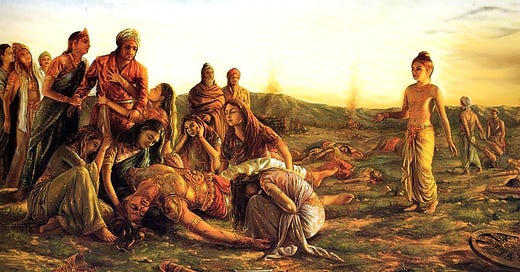The result of material attachment (Bg 1.30)
In material consciousness, we plan our actions according to the pleasant or unpleasant results they may offer, but because we lack perfect knowledge, our estimation is frequently incorrect.
« The Song of God: An in-depth study of the Bhagavad-gītā (Volume 1)
Verse 30: na ca śaknomy avasthātum, bhramatīva ca me manaḥ
nimittāni ca paśyāmi, viparītāni keśava
I am now unable to stand here any longer. I am forgetting myself, and my mind is reeling. I see only causes of misfortune, O Kṛṣṇa, killer of the Keśī demon.
In material consciousness, we plan our actions according to the pleasant or unpleasant results they may offer. If we conclude that the results of a certain activity will be unpleasant, we hesitate in doing it. The problem is that because we lack perfect knowledge, the parameters we use to calculate the results of our actions are imperfect, and thus we often make the wrong decisions.
Arjuna was seeing only causes of misfortune, calculating that both victory and defeat in the battle would bring him grief. Defeat would mean the loss of his life, while victory would mean the death of his relatives. As he calculated, both options would bring him loss, and as a result, his mind was reeling.
Material attachment makes us afraid of losing what we have and not achieving what we desire. This fear paralyzes us and makes us act in erratic ways. At this point, Arjuna became immersed in the bodily conception of life because of material attachment, and his first instinct was to run away from the problem, abandoning the battlefield.
As a kṣatriya, Arjuna had the duty of fighting in the battle. Due to fear and attachment, however, he was inclined to neglect this duty, which would just bring him to ruin, both in material and spiritual terms. By abandoning the battlefield, Arjuna would be condemned to a life of poverty, without a kingdom to manage and thus sustain himself. He would betray his brothers and the soldiers who trusted his leadership, and his social prestige would be destroyed. He would also be condemned to suffer the karmic results of neglecting his duty. However, before receiving the knowledge of the Bhagavad-gītā he was not able to consider this.
As a pure devotee and eternal associate of the Lord, there is no possibility for Arjuna to fall under the clutches of material energy. The doubts he showed were due to the will of the Lord, who wanted to temporarily put Arjuna in illusion so He could speak the Bhagavad-gītā to him. The will of a pure devotee like Arjuna is completely dovetailed with the desires of the Lord, and if the Lord wants, anyone can be put into illusion. Even Lord Shiva fell under the charms of Mohinī Mūrti, as described in the Srimad Bhagavatam. However, both the illusion of lord Shiva and Arjuna happened due to the expansion of the internal potency of the Lord, and not due to the influence of Maya.
In the following verses, Arjuna describes his reasons for considering not fighting in the war. The moral arguments Arjuna gives here are quite strong and are based on general principles given in the scriptures. Krsna however brings the discussion to a much higher level in the second chapter, going much further than ordinary dharma, and explaining thus the ultimate goal of life. Ordinary social duties recommended in the Vedas are important for all human beings, but the ultimate dharma is to serve the Lord. This great secret is gradually explained through the chapters of the Gītā.
Main points in the purport of Srila Prabhupada:
"I am now unable to stand here any longer. I am forgetting myself, and my mind is reeling. I see only causes of misfortune, O Kṛṣṇa, killer of the Keśī demon."
a) Arjuna was so impatient he felt unable to remain on the battlefield. This was also due to material attachment, which leads to fear and loss of mental equilibrium.
b) He calculated that he would lose both on victory and defeat (since loss would mean his death, and victory would mean the death of his relatives). Seeing only frustration ahead, he questioned why he was there.
c) Arjuna was showing ignorance of his real interest as a soul and becoming immersed in material attachment, concerned about his own material welfare. This was however due to Krsna's will.
« The Song of God: An in-depth study of the Bhagavad-gītā (Volume 1)




